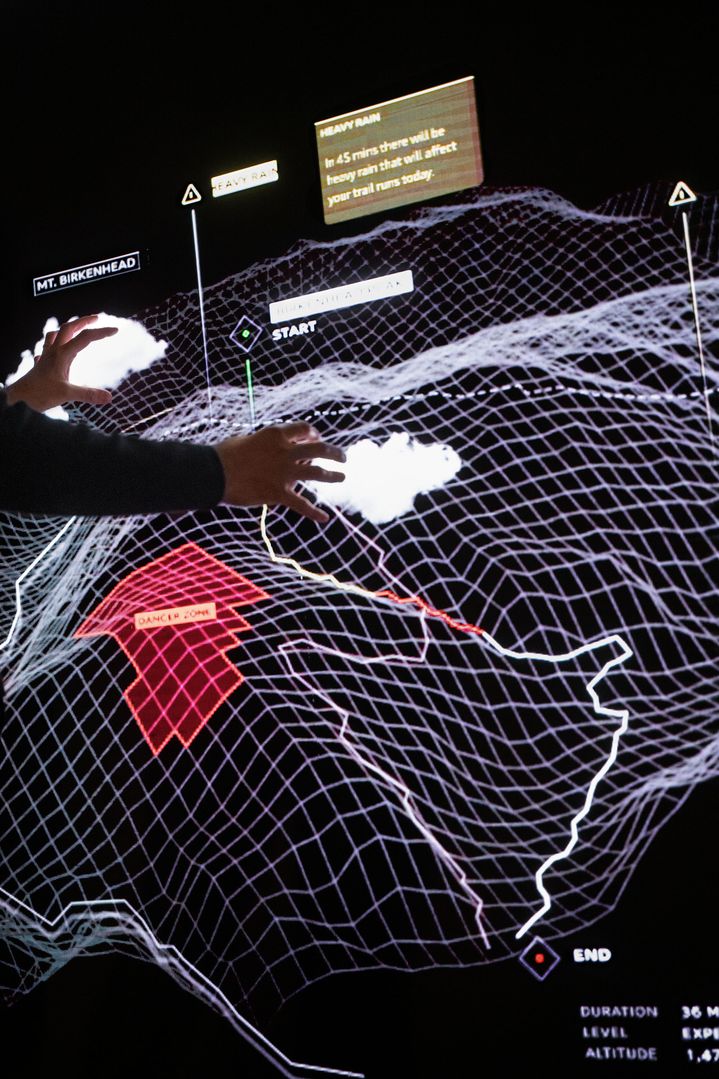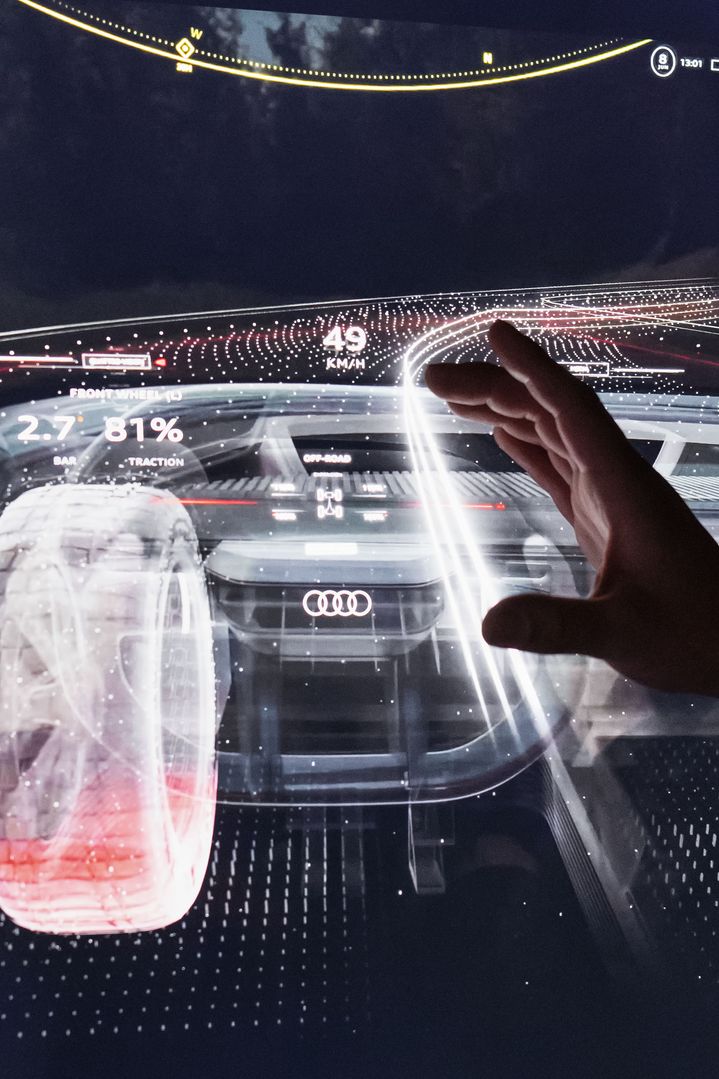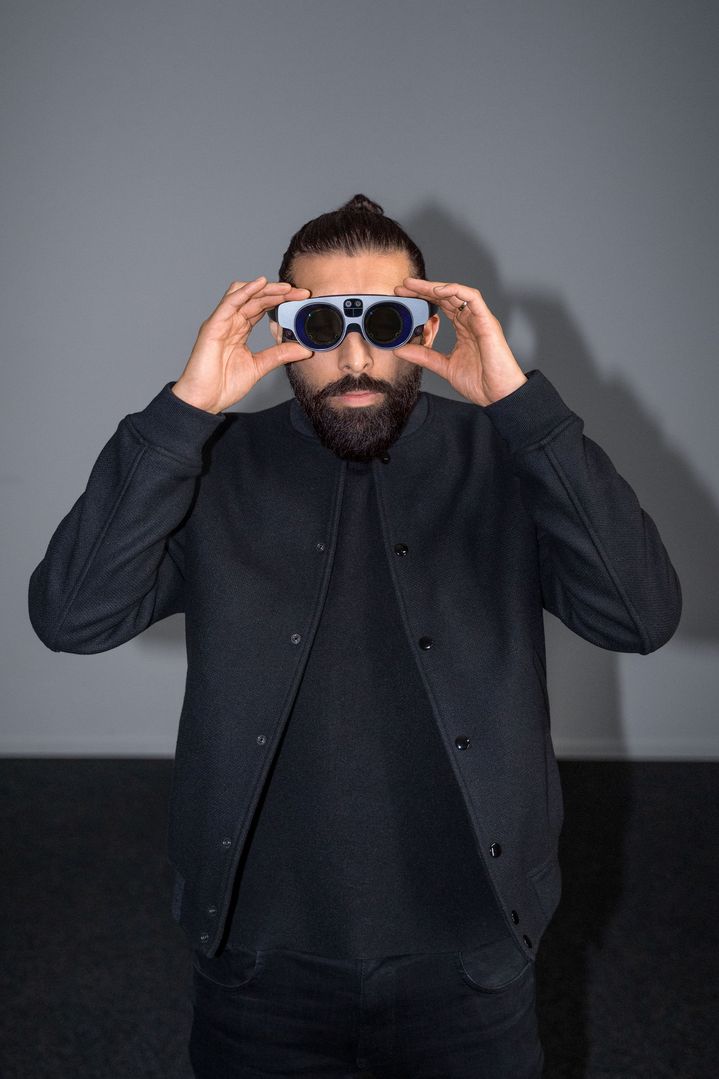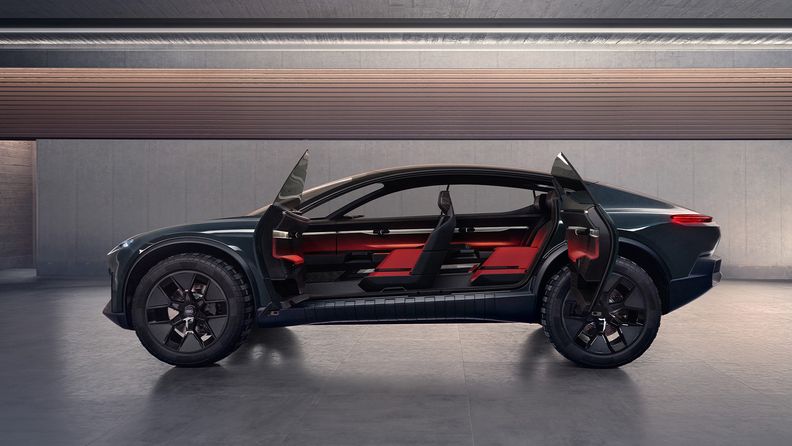Augmented reality
¹The vehicle shown is a concept vehicle that is not available as a production vehicle.
²The augmented reality glasses shown are also not available for purchase. The automated driving functions shown as well as the augmented reality glasses shown are technologies currently under development, are not available for production vehicles and only work within system limits. All possible uses of the technical systems and functions shown represent only a possible concept and are dependent on the respective legal regulations in the relevant country.
¹The vehicle shown is a concept vehicle that is not available as a production vehicle.
²The augmented reality glasses shown are also not available for purchase. The automated driving functions shown as well as the augmented reality glasses shown are technologies currently under development, are not available for production vehicles and only work within system limits. All possible uses of the technical systems and functions shown represent only a possible concept and are dependent on the respective legal regulations in the relevant country.
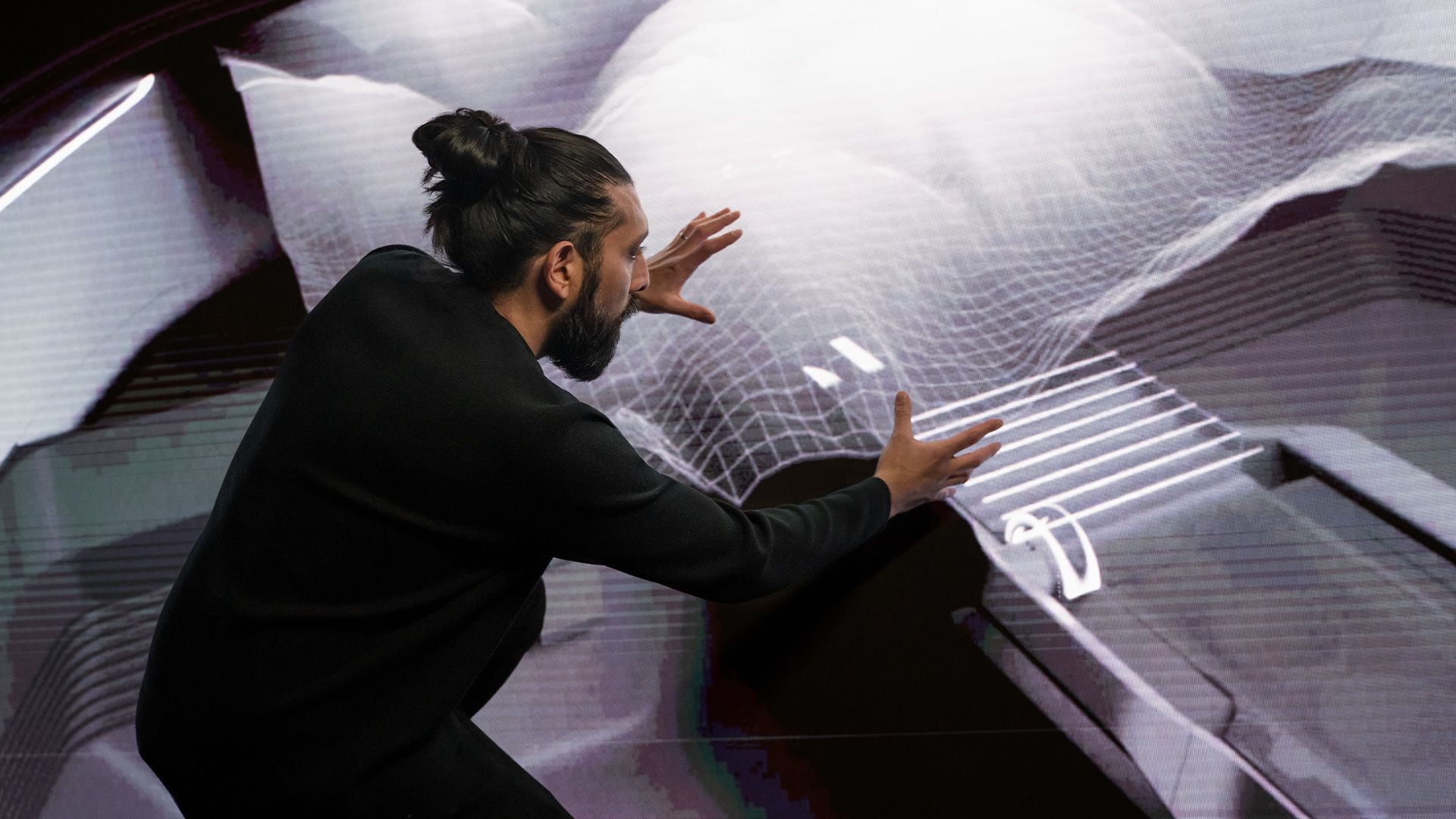
Sid, will we soon be driving cars with mixed reality glasses?
Many concept cars paint a vision of a future we hope to reach. I want to show how close we actually are to this vision and bring it to life in real life.
Progress through technology in Audi’s user interface design (UI) and user experience design (UX) means: We want to be at the forefront of this technology and use it to fill the experience with life, not just talk about it.
Your superior, Marc Lichte, Head of Design Audi, says that design starts with UI/UX and ends with UI/UX – i.e. with you. What does that mean?
I always refer to UI/UX as the bookends of a process. How does the technology communicate with man? What is the experience like? UX, or user experience – the experience a user has – should always start with understanding the user first. We need to identify what problem we are trying to solve.
Once we understand the problem, we develop solutions with the user at the centre of it all, and all design teams are involved in the design process. And then there is UI, the user interface, the actual place where the product or machine meets man.
How will UI/UX change our experience of a vehicle?
Audi looks back on over a hundred years of experience building cars. Only in the last ten years or so UI/UX was added as a requirement.
Today, we are really in a phase of transformation where UI/UX is becoming the core of the product. We all have these devices in our pockets, on our wrists. In this context, we must answer two questions: Is the product useful? And: Is it a good experience?
And this should also be asked of a vehicle. I really like the term that Audi has coined for its concept vehicles: experience device. The vehicle is just another part of our digital ecosystem.
“The vehicle is just another part of our digital ecosystem.”
As a customer, I’m used to my smartphone, my smartwatch, my computer, so should the car of the future work the same way?
Maybe the term is a bit overused, but yes, I would definitely say: it should work seamlessly, from the user perspective. After all, that’s why we use all our technical devices so naturally in everyday life: they just work extremely well. They’re always up to date, they work well together, you can switch back and forth between them very easily.
A vehicle should fit into our world in the same sense that all these devices do. As a purposeful, seamless companion. It should adapt to all the different requirements. You shouldn’t feel that you have to operate the car in a traditional way. It should meet you halfway, just like all devices do.
So which technological concept can be successful in that sense?
We are talking about a future in which the device of the future moves from the pocket and from the wrist to the face. At the heart of our system is a pair of high-performance mixed reality glasses¹ that allow all the information from augmented reality to interact with the world around you.
Because we don’t see MR glasses like just another entertainment device, as a lot of other people do. For us, it’s about showing a new level of information in the world around us that helps us carry out our activities.
¹The augmented reality glasses shown are also not available for purchase. The automated driving functions shown as well as the augmented reality glasses shown are technologies currently under development, are not available for production vehicles and only work within system limits. All possible uses of the technical systems and functions shown represent only a possible concept and are dependent on the respective legal regulations in the relevant country.
¹The augmented reality glasses shown are also not available for purchase. The automated driving functions shown as well as the augmented reality glasses shown are technologies currently under development, are not available for production vehicles and only work within system limits. All possible uses of the technical systems and functions shown represent only a possible concept and are dependent on the respective legal regulations in the relevant country.
“The mixed reality glasses enable seamless interaction.”
How does that work exactly?
In the Audi activesphere concept¹, we are demonstrating what is currently the most advanced manifestation of this technology with mixed reality: a better experience with less obvious technology in the interior. We want people to immerse themselves in the interface. The technical interface is no longer defined by frames, screens or projections. And that’s the full definition of immersion. You really are at the centre of this world. We call it Audi dimensions.
It’s about creating an experience that knows no limits. You can access the information where and when you want.
Contraction and expansion show the flexibility in the system. When you don’t need any information, the display can contract to a minimum. But when you need and want information, the user interface can expand and be at your fingertips. So, the system’s intelligence meets users halfway without overwhelming them with information and interactions.
For Audi, driving performance is always a priority. Even when the vehicles are automated, we still want to offer the best possible driving experience. We want to offer passengers new information that they haven’t seen before. For example, when driving off-road: What additional information will help me make tackle difficult terrain?
So, the mixed reality glasses show different information depending on the situation?
The Audi dimensions system shows three spatial levels, three information levels. First, the information in the cabin, which is traditionally found on the steering wheel. Then we can superimpose information onto the windshield. And finally, there’s a spatial field that extends from the bonnet to the surrounding area to display information about the vehicle’s environment.
If the user is driving off-road, we provide more information about the terrain there, showing the safest route. Real-time information about weather conditions or hazard warnings. But also: How steep is the slope, are there any obstacles? With the glasses, for example, you can also hide the vehicle’s body and see the direct interactions of a tyre with the terrain. That’s what we call quattro vision: Making the digital experience of quattro visible, beyond the drive technology.
¹The vehicle shown is a concept vehicle that is not available as a production vehicle.
¹The vehicle shown is a concept vehicle that is not available as a production vehicle.
Sid Odedra is from London, UK, and holds a degree in Product Design, a Masters in Design Engineering, and a PhD in Robotics (thesis on “A novel method of sensing and classifying terrain for autonomous unmanned ground vehicles”).
He has led creative and technical teams of designers, engineers and roboticists across a range of industries including the automotive, defense, entertainment, fashion and technology industry working on a number of high-profile international projects.
In his own London studio, his aspiration was to combine form and function for the use of technology to create “Things that Amaze”. He then lived and worked in Silicon Valley. Today, Sid Odedra is Head of UI/UX Design Audi.
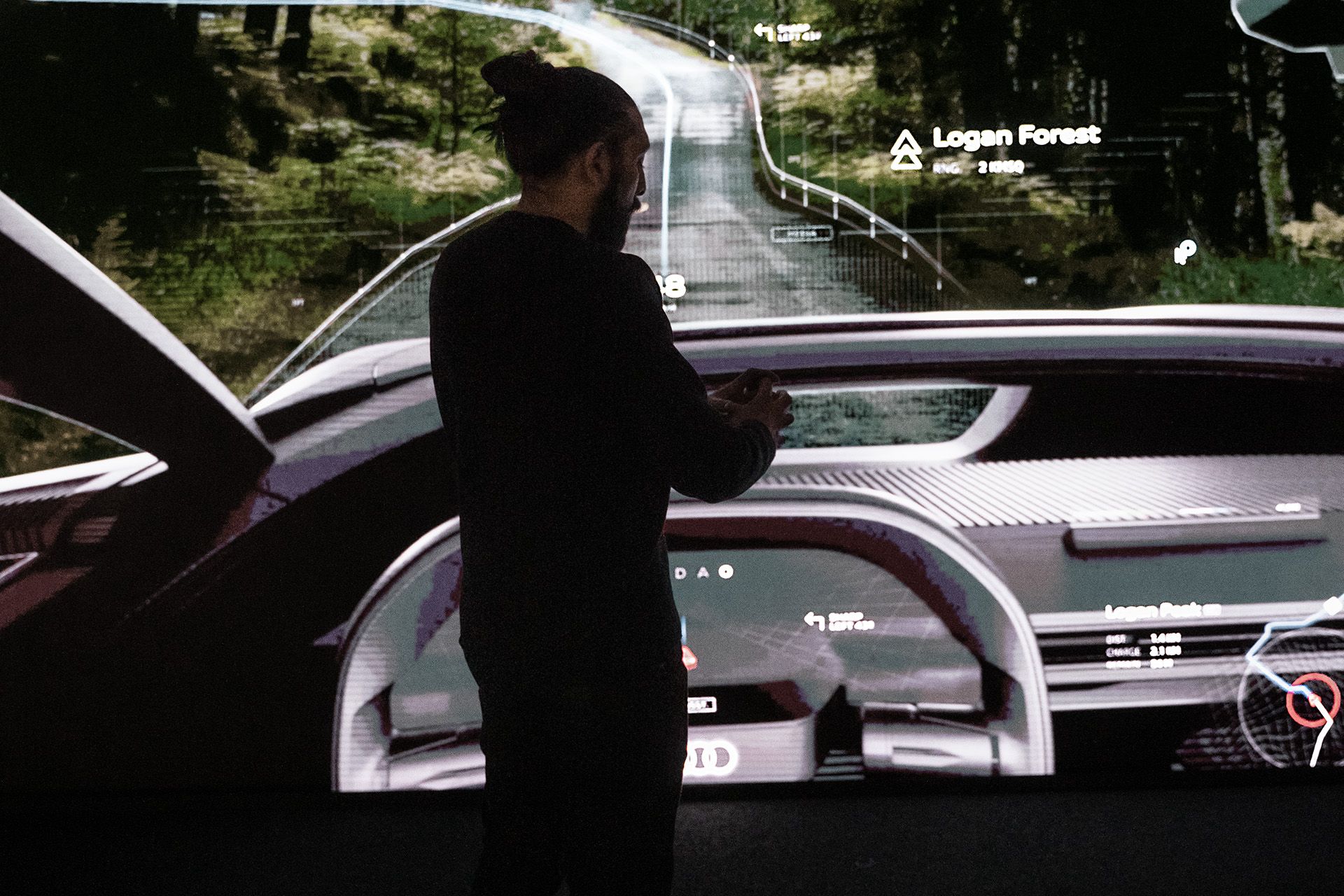
Will mixed reality glasses¹ also become a device that I will always take with me, just like my smartphone?
Yes, because the digital ecosystem is about being able to take your personal devices with you – whether it’s your glasses or other devices – and be able to use them well. The glasses¹ are part of the core experience, they’re not just something you put in the glove department, they become an asset and empower you to do more.
We think of the car and the experience device as part of the ecosystem. The experience shouldn’t stop when you leave the car. We think beyond the vehicle as such. How can we accompany our customers in the background throughout the day to be there when they need us?
New developments only catch on if they are accepted by the users. How do you want to achieve that?
I know of so many great technologies in other products, amazing high-tech systems, but they are so complex that people are too afraid to use them.
The value of successful products is that, first, they really understand the problem, second, they offer a great solution, and third, they make it understandable to a broad audience.
UI/UX must, of course, have an aesthetic intelligence that is typical of Audi. And it has to stimulate the customers a bit, give them confidence. I always tell my team we have to convince people with three things: confidence, comfort and convenience. And it’s a plus if you captivate them with emotions.
¹The augmented reality glasses shown are also not available for purchase. The automated driving functions shown as well as the augmented reality glasses shown are technologies currently under development, are not available for production vehicles and only work within system limits. All possible uses of the technical systems and functions shown represent only a possible concept and are dependent on the respective legal regulations in the relevant country.
¹The augmented reality glasses shown are also not available for purchase. The automated driving functions shown as well as the augmented reality glasses shown are technologies currently under development, are not available for production vehicles and only work within system limits. All possible uses of the technical systems and functions shown represent only a possible concept and are dependent on the respective legal regulations in the relevant country.

